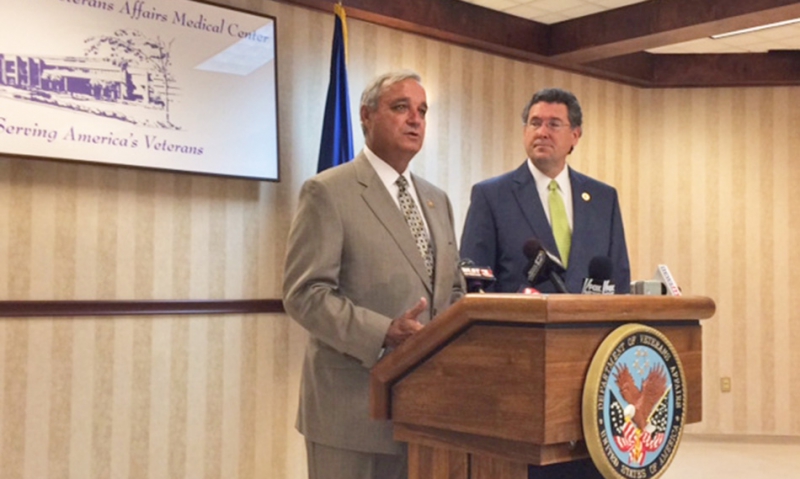
House Committee on Veterans' Affairs chairman wants bipartisan commission on VA medical care access as new whistleblowers surface nationwide.
As new allegations of secret waiting lists and manipulated appointment records were popping up across the country, Rep. Jeff Miller, R-Fla., was in Jackson, Miss., Tuesday to see what kind of progress is being made at one VA medical center where whistleblowing employees have revealed numerous problems to federal investigators.
The Jackson hospital and regional office have also been the focus of American Legion scrutiny and site visits. Miller and American Legion Executive Director Peter S. Gaytan learned in Jackson that improvements are slowly being made after 70-percent turnover of top managers at the 225-bed facility, which serves about 45,000 veterans a year.
"There have been issues that date back several years at this facility, and I see a movement in the proper direction," said Miller, chairman of the House Committee on Veterans' Affairs, after he met with Joe Battle, director of the G.V. Sonny Montgomery VA Medical Center, and other VA officials. "Are they there? No. Will they be fixed tomorrow? Probably not. There is a very large cultural shift that has to be made."
To that point, Miller sent a letter Tuesday to President Barack Obama requesting that he appoint a bipartisan commission to conduct a head-to-toe study of the entire VA system to recommend improvements and to help restore fast-eroding trust among veterans. More than 6.5 million U.S. military veterans receive health care at VA facilities, several of which have been under fire in the last year for failing to see patients in a timely manner and, in recent weeks, for covering up delayed appointment times. As many as 40 veterans may have died waiting for long-delayed medical appointments at the Phoenix VA Medical Center, which was the subject of an American Legion-led town hall meeting Tuesday in Arizona.
Accompanied by Rep. Gregg Harper, R-Miss., in whose district the Jackson medical center is located, Miller learned that in addition to numerous leadership changes at the facility in the last two years, other employees are receiving disciplinary actions for inadequate performance, and year-end bonuses are growing more difficult to achieve. The medical center has been under investigation for understaffing, long waiting times, poor sterilization procedures and patient misdiagnoses, all of which are being corrected, Battle told the chairman. The list of problems identified at Jackson mirrors other facilities around the country, including Phoenix, Seattle, Pittsburgh, Chicago, St. Louis, Atlanta, Cheyenne, Wyo., and Fort Collins, Colo., where appointment delays have reportedly been kept secret from VA Central Office, and have been blamed for veteran deaths in some instances.
Appointment-time performance is frequently among the criteria for executive bonuses at facilities. In most cases, such as two doctors who spoke out about the Phoenix hospital, employee whistleblowers have brought to light problems and accusations of cooking the appointment-time books at VA facilities. The American Federation of Government Employees, the nation's largest union of federal employees, released a statement Tuesday seeking protection for VA whistleblowers and "calling on the Department of Veterans Affairs to end the culture of fear that has plagued the agency and negatively impacted veterans' care. As recent headlines suggest, some management officials have been 'gaming the system' to artificially inflate performance statistics in their medical centers. What is not so recent is the widespread cover-up culture that pervades the VA."
Miller addressed with Battle, director at Jackson for two years, the issues of employee and executive accountability, transparency and whistleblowing.
"I got assurances from him that those who are raising questions can be heard," Miller said. "When you rise to the level of a whistleblower – and you attain that status – obviously there is a concern that sometimes retribution might take place. I don't expect to see that here. If we do, we will be back to talk about those issues. I know that under the past administration, it was a little bit difficult, to say the least, for people to be able to express exactly what they feel. I would hope that what was told to us today is, in fact, the truth, that they will listen to people and not have any retribution."
One challenge raised by VA officials in the meeting and later recognized by Miller is the difficulty recruiting health-care professionals after a facility's problems have been made public.
"One of the toughest things to do, especially when there is negative publicity about a facility, is to recruit people," Miller said. "What we don't want to do is scare away veterans. What we don't want to do is to scare away qualified nurses and physicians and other support staff. There continues to be an out-of-balance situation when it comes to nurse practitioners and physicians. That needs to be corrected."
Miller, Harper and Gaytan visited the VA regional office attached to the Jackson medical center, where they were told that the inventory of undecided claims has been reduced by 30 percent and the average age of a claim has fallen from 290 days in January 2013 to 196 days today. Harper said the Jackson visit by Miller was deeply appreciated, a step along the road to recovery for one VA facility whose problems were diagnosed early in what is threatening to become an epidemic.
“We want to make sure that now – and in the future – our veterans get the care they deserve,” Harper said.
- Veterans Healthcare

